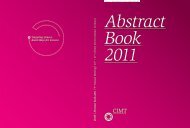Abstract Book 2010 - CIMT Annual Meeting
Abstract Book 2010 - CIMT Annual Meeting
Abstract Book 2010 - CIMT Annual Meeting
You also want an ePaper? Increase the reach of your titles
YUMPU automatically turns print PDFs into web optimized ePapers that Google loves.
082 Bonertz | Tumor biology & interaction with the immune system<br />
Antigen-specific Treg in colorectal carcinoma control T cell<br />
responses against a limited tumor antigen repertoire<br />
Andreas Bonertz 1 , Jürgen Weitz 2 , Kim Pietsch 1 , Christoph Schlude 1 , Simone Jünger 1 , Yingzi<br />
Ge 1 , Kashayarsha Khazaie 3 , Moritz Koch 2 , Philipp Beckhove 1<br />
1 Translational Immunology Unit, The German Cancer Research Center, Heidelberg, Germany<br />
2 Department of Visceral Surgery, University Hospital of Heidelberg, Heidelberg, Germany<br />
3 Division of Gastroenterology, Northwestern University Feinberg School of Medicine,<br />
Robert Lurie Comprehensive Cancer Center, Chicago, Illinois, USA<br />
Previous studies suggest that regulatory T cells<br />
(Treg) may suppress a tumor-specific immune<br />
response against established tumors in patients.<br />
Here, we examined how a depletion of Treg influences<br />
the immune reactivity of colorectal carcinoma<br />
(CRC) patients against tumor associated antigens<br />
(TAA) and screened for the specificity of Treg<br />
in the same patients.<br />
We analyzed the T cell (TC) repertoires from the<br />
peripheral blood (PB) of 170 CRC patients for the<br />
presence and frequencies of spontaneously induced<br />
effector/memory TC against synthetic polypeptides<br />
spanning immunogenic regions from 9 different<br />
TAAs (CEA, EGFR, Heparanase, Her2/neu, Mage-3,<br />
Muc-1, p53, Survivin, Telomerase) before and after<br />
depletion of Treg by short-term IFNγ enzyme-linked<br />
immunospot analysis. In comparison, we assayed<br />
PB from 32 healthy donors for the presence of<br />
TAA-specific TC. Patients and healthy donors were<br />
divided into HLA-A2 positive and negative cohorts.<br />
Furthermore, we evaluated for the first time the<br />
specificities of Treg in the same patients for the respective<br />
TAAs. For this, dendritic cells were pulsed<br />
with TAA-peptides or IgG control antigen, coincubated<br />
with autologous Treg and analyzed for the<br />
Treg capacity to suppress in an antigen-dependent<br />
manner the proliferation of polyclonally activated<br />
conventional TC.<br />
In the majority of patients (60%), TAA specific TC<br />
were detected. The TAA recognition pattern was<br />
highly diverse within the CRC patients and was<br />
independent of the patients HLAtype. Healthy individuals<br />
contained significantly less TAA-reactive<br />
TC. After Treg depletion, the proportion of TAAreactive<br />
patients increased to 86%. The strongest<br />
increases of recognition were found for Muc-1 (14%<br />
vs. 39%), EGFR (13% vs. 38%), and CEA (18% vs.<br />
39%), which was also associated with an increase<br />
of the frequencies of TC specific for these antigens.<br />
Treg reacted specifically for individual TAAs in the<br />
PB of 40% of CRC patients.<br />
Treg-induced suppression of proliferation was most<br />
prevalently observed after Treg activation with<br />
Muc-1, HER2/neu, and CEA, whereas Treg specific<br />
for p53 were not observed. Interestingly, specificities<br />
of memory TC and Treg markedly differed<br />
in the majority of patients, leaving the possibility<br />
of using selected sets of TAA for tumor vaccinations<br />
that induce optimal effector TC responses but<br />
minimal Treg activity.<br />
131



